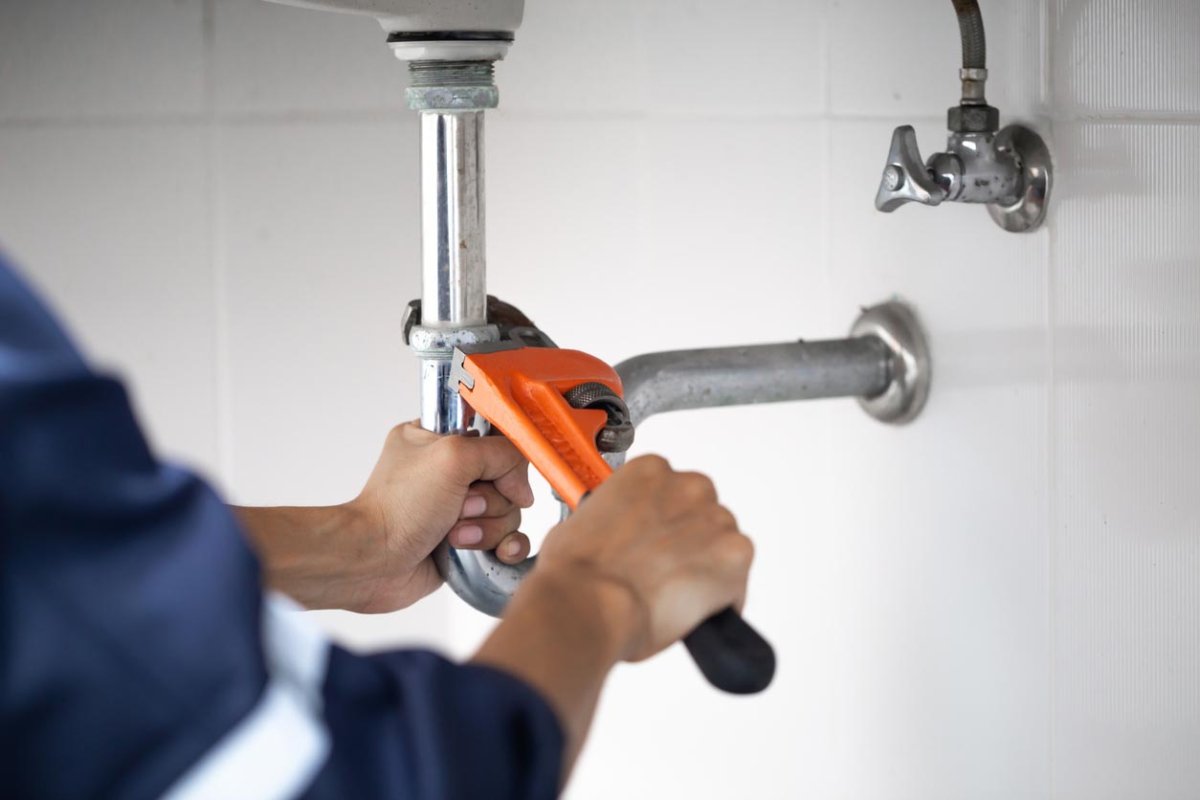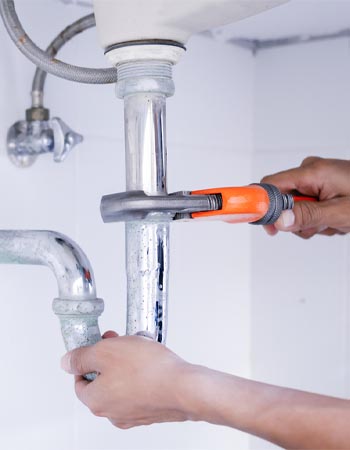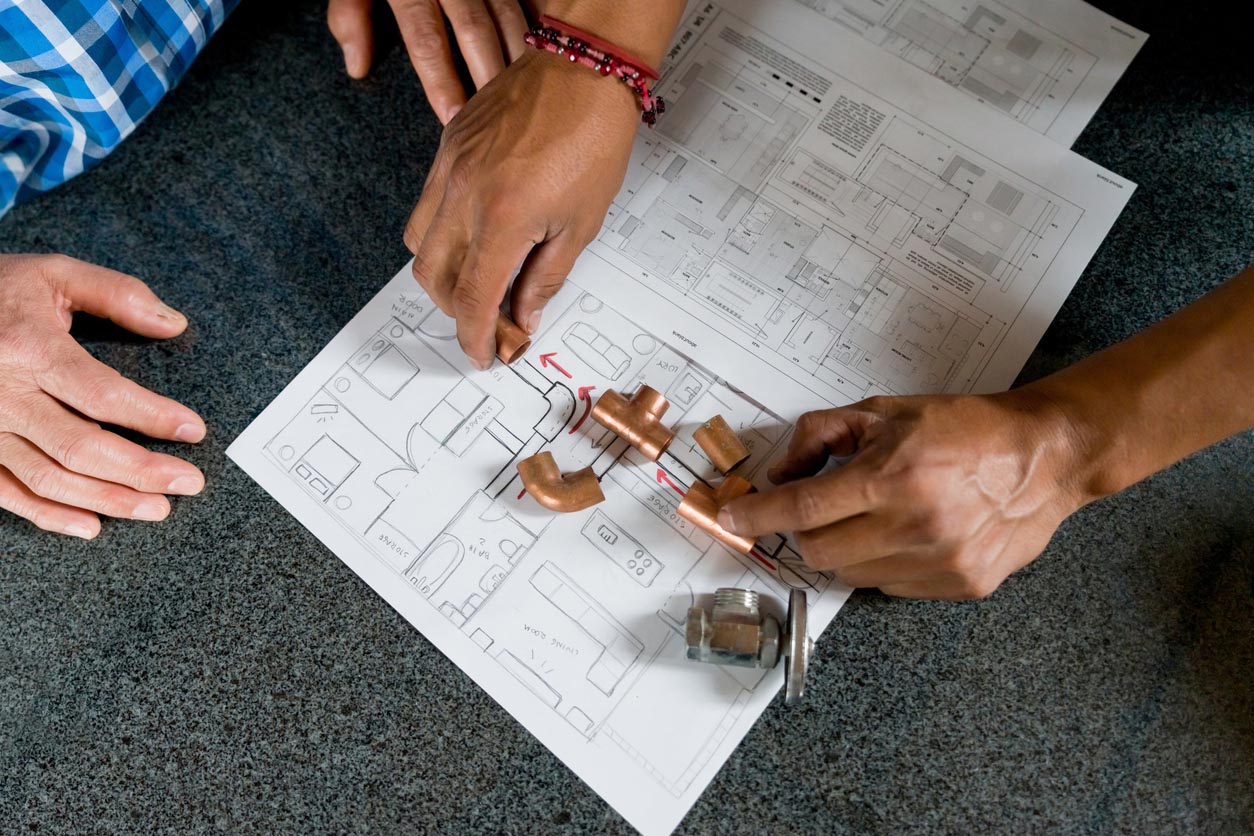

We may earn revenue from the products available on this page and participate in affiliate programs. Learn More ›
Many skilled trades require a specific certification or license as proof that an employee has had official training and education. The plumbing business is no different, and a plumbing certification allows an individual to work as a licensed plumber to repair, install, or maintain various plumbing systems. While the high school years can be a great time to learn how to get a plumbing license, it’s never too late to find out how to get into plumbing. In fact, all a person needs to get a plumbing apprentice license is to register as an apprentice under a licensed master plumber.
However, the exact steps for becoming a plumber, getting a journeyman plumber license, and acquiring a master plumber license can vary depending on the state plumbing license requirements. Additionally, some states may have plumber education requirements, such as a high school diploma, GED, or the successful completion of a trade school program. Aspiring plumbers will want to learn more about the various aspects of this career and how to get a plumbing license so they can get to work.
Before You Begin…

Before a student starts down the path of obtaining a plumbing license, it’s a good idea to become familiar with the different certification levels, as well as the average plumber salary. This can help the students decide whether this is the right career path for them and how far they want to take their career. Not every plumber decides to start a plumbing company or pursue a master plumber license.
There are three main levels of certification in the plumbing industry, including apprentice plumbers, journeyman plumbers, and master plumbers. On average, a professional plumber will make about $60,090 annually, according to the U.S. Bureau of Labor Statistics (BLS). However, apprentice plumbers earn the least due to their general lack of experience and the need to be supervised while they work. Master plumbers earn the most because they have obtained certification that proves their level of skill and expertise in the field.
As James De Meo, master plumber and HVAC engineer with Montgomery, Alabama-based home improvement website This Fixed House, explains, “The criteria and difficulty of obtaining a plumbing license varies by state. But generally speaking, most applications involve completing an apprenticeship or a set number of work hours, passing a licensing exam that tests knowledge of the trade and local plumbing codes, and some form of ongoing education to maintain the license.”
Tips for How to Get a Plumbing License
- Research local trade schools that have top-tier plumbing programs.
- Meet with master plumbers in the area that are looking to take on apprentices.
- Read up on the top plumbing tips and practice plumbing skills on DIY jobs to become more familiar with plumbing systems.
- Look into state-specific licensing requirements to determine what is necessary at each licensing level.
STEP 1: Check with your state’s board of plumbing to determine the specific plumbing license requirements in your location.
Learning how to become a licensed plumber starts with a basic understanding of the requirements to get a plumbing license. These requirements can vary by location, so it’s important for aspiring plumbers to research the types of business licenses required in their current area and any other states where they plan to work. The exact steps for how to get a business license will vary depending on where the plumber lives and works.
“Check state and local license requirements to determine what is needed to secure a plumbing license in the area. Some states, like Kansas or Missouri, do not have licensing requirements, while most others have strict regulations that require proof of on-the-job and in-class experience.”
Some states may differentiate between a plumbing license and a plumbing contractor license. Plumbing contractors typically hold additional training and licenses, allowing them to work for larger plumbing companies in an expanded capacity. Aspiring plumbers will want to note that, while some states allow individuals to complete plumbing work unlicensed, the local municipalities in these areas may have their own requirements and regulations.
In most states, operating without a license isn’t a good idea. Without taking the appropriate steps to become a licensed plumber, an individual could face a hefty fine and the possibility of jail time. Similarly, before hiring a new plumber, plumbing companies often conduct a thorough background check, as well as require proof of plumbing certification, before hiring a new plumber. Different states will also have varying requirements about plumbing license renewal. Below are the basic plumbing licensing requirements by state.
| State | Plumbing License Requirements |
| Alabama | License required for any plumbing work. Apprentice, journeyman, and master plumber licenses available through the Alabama Plumbers and Gas Fitters Examining Board. |
| Alaska | License required for any plumbing work. Journeyman and master plumber licenses available through the Department of Labor and Workforce Development. |
| Arizona | License required for any plumbing work. Journeyman and master plumber licenses available through the Arizona Registrar of Contractors. |
| Arkansas | License required for any plumbing work. Journeyman and master plumber licenses available through the Arkansas Department of Health. |
| California | C-36 contractor’s license required for projects worth more than $500 through the California Contractors State License Board. |
| Colorado | License required for any plumbing work. Residential, journeyman, and master plumber licenses available through the Colorado Department of Regulatory Agencies. |
| Connecticut | License required for any plumbing work. Unlimited journeyman and unlimited plumbing contractor licenses available through the Connecticut State Department of Consumer Protection. |
| Delaware | License required for any plumbing work. Journeyman and master plumber licenses available through the Board of Plumbing, Heating, Ventilation, Air Conditioning, and Refrigeration Examiners. |
| Florida | License required for any plumbing work. Registered plumbing contractor and certified plumbing contractor licenses available through the Florida Construction Industry Licensing Board. |
| Georgia | License required for any plumbing work. Journeyman plumber and master plumber (class one and class two) licenses available through the Georgia State Division of Master and Journeyman Plumbers. |
| Hawaii | License required for any plumbing work. Journey worker and master plumber licenses available through the Board of Electricians and Plumbers. |
| Idaho | License required for any plumbing work. Journeyman and plumber contractor licenses available through the Idaho Division of Occupational and Professional Licenses. |
| Illinois | License required for any plumbing work. Apprentice, plumbing contractor, and irrigation contractor licenses available through the Illinois Department of Public Health; additional licensing may be required through the Chicago Department of Buildings. |
| Indiana | License required for any plumbing work. journeyman and plumbing contractor licenses available through the Indiana Professional Licensing Agency. |
| Iowa | License required for any plumbing work. Apprentice, journeyman, and master plumber licenses available through the Iowa Plumbing and Mechanical Systems Board. |
| Kansas | No state licensing requirements for plumbers; optional Class DP plumbing contractor license available through county governments. |
| Kentucky | License required for any plumbing work. Journeyman and master plumber licenses available through the Kentucky Department of Housing, Buildings and Construction. |
| Louisiana | License required for any plumbing work worth more than $10,000. Journeyman and master plumbing licenses available through the Louisiana State Licensing Board for Contractors. |
| Maine | License required for any plumbing work. Trainee, journeyman in training, journeyman, and master plumber licenses available through the Plumbers’ Examining Board. |
| Maryland | License required for any plumbing work. Journeyman and master plumber licenses available through the Department of Labor, Licensing, and Regulation. |
| Massachusetts | License required for any plumbing work. Apprentice, journeyman, and master plumber licenses available through the Board of State Examiners of Plumbers and Gas Fitters. |
| Michigan | License required for any plumbing work. Journeyman and master plumber licenses available through the Michigan Department of Licensing and Regulatory Affairs. |
| Minnesota | License required for any plumbing work. Journeyman and master plumber licenses available through the Minnesota Department of Labor and Industry. |
| Mississippi | License required for any residential plumbing work worth more than $10,000 or commercial plumbing work worth more than $50,000. Unlimited commercial and unlimited residential plumbing licenses available through the Mississippi State Board of Contractors. |
| Missouri | License required for any plumbing work performed in a city or town with more than 15,000 people. Journeyman and master plumber licenses available through the city or county where the individual plans to work. |
| Montana | License required for any plumbing work. Plumber apprentice, journeyman plumber, master plumber, and plumbing contractor licenses available through the Montana Board of Plumbers. |
| Nebraska | No state licensing requirements for plumbers. Local municipalities may have licensing requirements. |
| Nevada | License required for any plumbing work. Journeyman plumber, master plumber, and plumbing contractor licenses available through the Nevada Board of Plumbing Examiners. |
| New Hampshire | License required for any plumbing work. Journeyman and master plumber licenses available through the Mechanical Safety and Licensing Board. |
| New Jersey | License required for any plumbing work. Journeyman and master plumber licenses available through the New Jersey Division of Consumer Affairs. |
| New Mexico | License required for any plumbing work. Journeyman plumber and plumbing contractor licenses available through the New Mexico Regulation & Licensing Department. |
| New York | License required for any plumbing work. Journeyman and master plumber licenses available through local city and county governments. |
| North Carolina | License required for any plumbing work. Plumbing class 1, plumbing class 2, restricted limited plumbing contractor, and state and local government technician licenses available through the State Board of Examiners of Plumbing, Heating, and Fire Sprinkler Contractors. |
| North Dakota | License required for any plumbing work. Apprentice, journeyman, and master plumber licenses available through the State Plumbing Board. |
| Ohio | License required for any plumbing work. Commercial contractor license available through the Ohio Construction Industry Licensing Board. |
| Oklahoma | License required for any plumbing work. Journeyman plumber and plumbing contractor’s licenses available through the Oklahoma Construction Industries Board. |
| Oregon | License required for any plumbing work. Journeyman plumber and contractor licenses available through the Oregon Building Codes Division. |
| Pennsylvania | No state licensing requirements for plumbers. Local municipalities may have licensing requirements. |
| Rhode Island | License required for any plumbing work. Journeyman and master plumber licenses available through the Rhode Island Department of Labor and Training. |
| South Carolina | License required for any plumbing work. Residential and commercial plumber licenses available through the South Carolina Residential Builders Commission. |
| South Dakota | License required for any plumbing work. Plumber apprentice, journeyman plumber, and plumbing contractor licenses available through the South Dakota Department of Labor and Regulation. |
| Tennessee | License required for any plumbing work. Limited license plumber and mechanical plumbing contractor licenses available through the Tennessee Department of Commerce & Insurance. |
| Texas | License required for any plumbing work. Tradesman, journeyman, and master plumber licenses available through the Texas State Board of Plumbing Examiners. |
| Utah | License required for any plumbing work. Journeyman and master plumber licenses available through the Utah Division of Professional Licensing. |
| Vermont | License required for any plumbing work. Journeyman and master plumber licenses available through the Department of Public Safety, Division of Fire Safety. |
| Virginia | License required for any plumbing work. Journeyman and master plumber licenses available through the Virginia Department of Professional and Occupational Regulation. |
| Washington | License required for any plumbing work. Plumber trainee, journeyman, and specialty licenses available through the Washington State Department of Labor & Industries. |
| West Virginia | License required for any plumbing work. Plumber in training, journeyman, and master plumber licenses available through the West Virginia Division of Labor. |
| Wisconsin | License required for any plumbing work. Journeyman and master plumber licenses available through the Department of Safety and Professional Services. |
| Wyoming | No state licensing requirements for plumbers. Local municipalities may have licensing requirements. |

STEP 2: Review the exam requirements in your state and complete the necessary training or education.
Most states require an individual to have completed a high school education or to have a GED in order to work as a plumbing apprentice. From there, each state has different requirements on the number of hours an individual must work as an apprentice under a licensed plumber before they can apply for a plumbing license. Some states may even require an aspiring plumber to get an apprentice plumber license in order to train under a journeyman or master plumber.
In addition to work experience, some states may require, or encourage, a trainee to take continuing education courses, either through a trade school or by taking one of the best online plumbing courses. Ideally, a plumber apprenticing under a master plumber will also spend some time studying in a trade school to ensure that they fully round out their knowledge, hands-on skills, and on-the-job experience. Plumbing school costs an average of $3,000.
Trainee plumbers will want to keep in mind that an apprenticeship is a commitment. The pay is lower than what journeyman and master plumbers make, and the apprentice will need to accumulate an average of 4,000 to 12,000 hours before they can take the test to obtain a journeyman plumber license. The exact number of hours will depend on the state in which the trainee lives. Those who are interested in specific areas of the plumbing industry will want to seek out an apprenticeship with one of the best plumbing services that specializes in those areas.
STEP 3: Study for and take the exam to become a licensed plumber who can work without supervision.
After spending several years as an apprentice, the plumber can study and take a test to become a licensed journeyman plumber. This certification will allow the plumber to work without supervision and receive a higher salary for their work. The plumber will need to contact the licensing body for their state and fill out an application to take the test. This will generally include showing proof of experience, completing a basic application form, and paying a small fee to take the test. A background check may also be required, though this will depend on the state.
The journeyman plumber license test will typically be made up of situation-based scenarios that the test-taker needs to be able to recognize and respond to with accurate information gained through hands-on experience and in-class learning. Individuals who are planning to take the journeyman plumber licensing test will need to study and consider taking one or more practice tests to prepare. Another great way to get ready for the test is to consult with other plumbing professionals who have taken the test previously.
Once apprentice plumbers have successfully completed the test, they will be licensed journeyman plumbers. At this skill level, some plumbers will choose to leave the company they apprenticed with to start their own plumbing business, though it can be beneficial to spend 1 to 2 years working for an established company while building up enough financial investment to start a new company.
STEP 4: Complete the state-required number of hours working as a journeyman before applying for a master plumber license.
The exact licensing requirements to become a master plumber vary by state, so individuals will want to check the state-specific regulations for their area. In most cases, an individual will be required to work as a journeyman plumber for 1 to 2 years and provide proof of this experience before being allowed to take the master plumber licensing test. Master plumbers are often responsible for maintaining and repairing indoor and outdoor plumbing systems in residential, industrial, commercial, and institutional settings.
The master plumber licensing exam will test the individual’s knowledge of a wide variety of plumbing systems, including fire suppression systems, storm drainage systems, water supply systems, the installation of plumbing systems, knowledge of the international plumbing code, knowledge of the international fuel gas code, plumbing terminology, and plumbing job management. After passing this test, the individual will receive their master plumber license, which is highly recommended for plumbers who want to start their own plumbing business and is also necessary to run apprenticeship programs for new plumbers.
STEP 5: Check to see if your state has a reciprocal agreement with nearby states if you plan on working in more than one state; if not, apply for additional licenses.
Because there can be significant differences in the licensing requirements from one state to another, receiving a license in one state does not automatically certify the individual to work as a professional plumber anywhere in the country. Unfortunately, plumbers who decide to move may have to retake their plumbing license tests to receive a state-specific license.
However, in most cases, the plumber will not need to reinvest years of their life in an apprenticeship program. As long as there is proof of the work experience, most licensing organizations will allow the plumber to take the test immediately, though there will still be a small fee to take the test. The plumber will not be able to work in the state until they have completed this step in the process.
Some states have a reciprocal agreement with one or more nearby states, so it’s worth the plumber checking to see if this applies in their location. Plumbers can check the National Center for Construction Education and Research (NCCER) to determine which states have reciprocity agreements.

STEP 6: Decide whether you will operate as a sole proprietor or whether you will form a limited liability company.
Once an individual has their plumbing license, they’ll need to determine whether they want to operate as a sole proprietor or form a limited liability company (LLC). There are benefits and drawbacks to each.
Plumbers who don’t intend to form a business with employees may prefer the simplicity of sole proprietorship. There’s less paperwork involved, and the plumber can get started right away. However, a sole proprietor has no separation between their personal and business finances, which can open them up to liability if a client has a dispute with the service provider.
Forming an LLC requires more paperwork but also provides the plumber with liability protection. The LLC operates as a separate entity from the plumber, meaning the owner’s personal finances and assets are safe from collection to satisfy any debts the LLC carries, or if the business faces a liability lawsuit. There are also tax advantages to forming an LLC.
Plumbers who choose this option may want to work with one of the best LLC services, such as LegalZoom or Northwest Registered Agent, to make sure everything is set up correctly.
STEP 7: Obtain the proper insurance required by your state.
Some states require plumbers to carry liability insurance in order to get a plumbing license. Even if a plumber lives in a state without this requirement, they’ll still want to get this coverage to help protect themselves from liability. A policy from one of the best small-business insurance providers, such as NEXT Insurance or Thimble Insurance, can include coverage for general liability, property damage, and more.
Although the cost of plumbing insurance is just another item to add to a plumber’s budget, it’ll be well worth it if they find themselves facing a lawsuit from a client.
STEP 8: Build your client list by utilizing lead-generation websites such as Angi, HomeAdvisor, Thumbtack, or Handy.
Once the plumber has met their state’s licensing and insurance requirements, they can start to build their client base. There are several ways to grow a plumbing business, but one of the most effective ways is to list the business on one or more of the best lead-generation websites for contractors.
Websites such as Angi, HomeAdvisor, Thumbtack, and Handy often allow contractors to list their business for free. If a potential client reaches out to the contractor through one of these listings, the website will charge a lead-generation fee. However, the fee is often minimal, especially if the lead turns into a lucrative plumbing project, or even a repeat client.
Plumbing can be a challenging and rewarding career. However, a plumbing license is required in most states and local municipalities before one can work as a professional plumber. Ambitious individuals who want to train their own apprentices, start a plumbing business, or simply earn a higher salary can then pursue the master plumber license after working as a journeyman plumber for 1 to 2 years.
